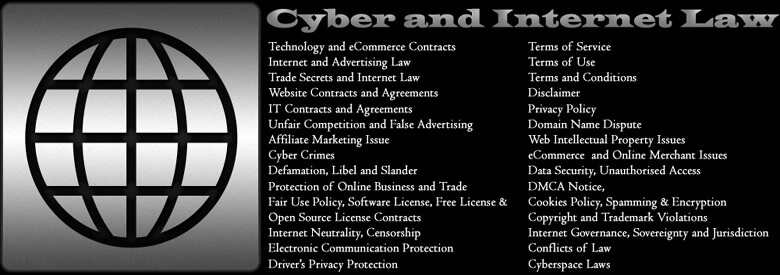Internet Laws deal with the following legal issues:
- Software law
- Intellectual property
- Copyright
- Rules on fair use
- Special rules on copy protection for digital media
- Software patents
- Software licenses
- End user license agreements
- Free software licenses
- Open-source licenses
- Product liability
- Professional liability of individual developers
- Warranties
- Contract law
- Trade secrets
- Computing and communication industries
- Unauthorized access
- Data privacy and spamming
- Use of encryption
- Equipment which may be used to defeat copy protection schemes.
- The export of hardware and software between Internationally
- Trade on the Internet
- Taxation
- Consumer protection
- Censorship versus freedom of expression
- Public access to government information
- Individual access to information Laws
- Computerized voting technology
Important Internet Laws of the world include the following:
- Privacy Act of 1974 (United States)
- Foreign Intelligence Surveillance Act of 1978 (United States)
- (1986) Electronic Communication Privacy Act (United States)
- (1994) Driver’s Privacy Protection Act (United States)
- (1999) Gramm-Leach-Bliley Act (United States)
- (2002) Homeland Security Act (United States)
- (2004) Intelligence Reform and Terrorism Prevention Act (United States)
- The Computer Misuse Act 1990 (United Kingdom)
- India’s Information Technology Act, 2000 (India)
- Electronic Transactions Act 2002 Pakistan (Pakistan)
- Electronic Signatures Laws
- Information technology law
- Florida Electronic Security Act
- Illinois Electronic Commerce Security Act
- Texas Penal Code – Computer Crimes Statute
- Maine Criminal Code – Computer Crimes
- Singapore Electronic Transactions Act
- Malaysia Computer Crimes Act
- Malaysia Digital Signature Act
- UNCITRAL Model Law on Electronic Commerce (United Nations Commission on International Trade Law)
- Thailand Computer Crimes Act
- ABA Digital Signature Guidelines (United States)
- Australia – Electronic Transactions Act 1999
- Costa Rica – Digital Signature Law (2005)
- European Union – Electronic Signature Directive (1999/93/EC) (EU)
- Mexico – E-Commerce Act – 2000 (Mexico))
- Digital Signature And Electronic Authentication Law (United States)
- Electronic Signatures in Global and National Commerce Act (United States)
- Government Paperwork Elimination Act (GPEA) (United States)
- Uniform Commercial Code (UCC) (United States)
- Uniform Electronic Transactions Act – adopted by 46 states (United States)
- UK – Electronic Communications Act 2000 (United Kingdom)
United Nations Commission on International Trade Law (UNCITRAL) is a UN legal body working on laws and rules formulation on commercial transactions. For electronic transaction and eCommerce following are some works of UNCITRAL:
- Recommendation on the Legal value of Computer Records (1985)
- UNCITRAL Model Law on Electronic Commerce (1996)
- UNCITRAL Model Law on Electronic Signatures (2001)
- The Model Law on Electronic Commerce, adopted in 1996 by UNCITRAL
- The UNCITRAL Model Law on Electronic Signatures, adopted in 2001
Juris Logium provides worldwide services for Internet Law issues.










